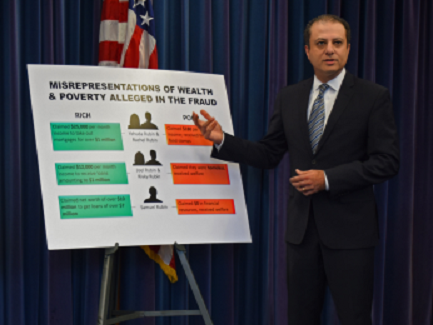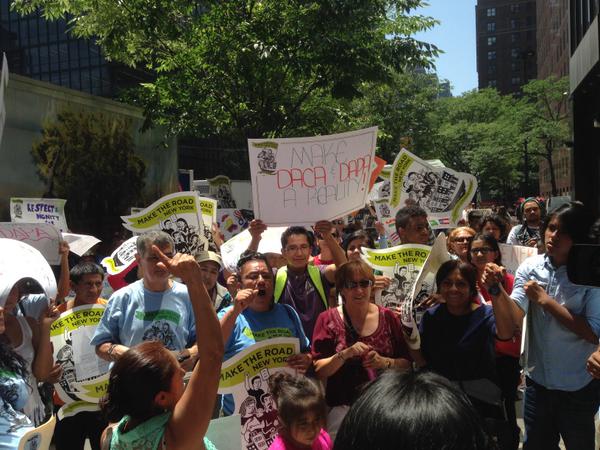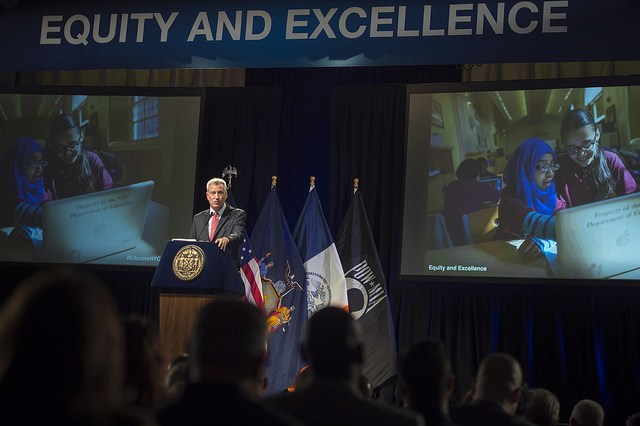Latest Prison Sentencing Recalls History of Legislative Corruption and Achievement

US Attorney Preet Bharara prosecutes corruption (photo via justice.gov)
Ex-Queens Assemblymember William Scarborough is the latest New York State legislator to be convicted of corruption. Scarborough, a lawmaker for two decades, filed 174 phony travel vouchers between 2009 and 2012 to receive more than $54,000 in unwarranted per diems. He put in for travel reimbursements on some days when he was at home in his district, not in or in transit to Albany.
Scarborough resigned his Assembly seat after being indicted last spring. He was sentenced to 13 months in federal prison for his crimes. He also received a year on state charges for misuse of campaign funds, which will be served at the same time as his federal incarceration.
But at his sentencing, U.S. District Court Judge Thomas A. McAvoy was almost apologetic for imposing the prison term. "I think essentially you're a good, decent human being who just made a mistake...a good representative of the people," he told Scarborough.
Since 1999, more than 30 state lawmakers have been forced from office due to ethical misconduct or conviction for crimes. Earlier this year, the Speaker of the Assembly and the Majority Leader of the Senate were both indicted and forced from their leadership posts.
But Judge McAvoy's comments remind us of how complicated New York politics can be. Scarborough was both a good representative of the people in his district and also a crook. New York is a politically complicated place. Appearances can be deceiving. Sometimes, legislative corruption and progressive legislation exist side by side.
Albany politics from a century or so ago provides some useful comparisons and insights.
History books often focus on corruption in the legislature in the last years of the 19th century and the opening years of the 20th, including corporations influencing legislators to secure beneficial legislation and political "bosses" unresponsive to the people heading both parties.
Senate Majority Leader Jotham Allds resigned in disgrace in 1910 after it was revealed that he had taken a bribe to kill a legislative proposal when he had been in the Assembly years earlier.
Governor William Sulzer was impeached and removed from office in 1913 for misuse of campaign funds. Legislative investigations and newspaper revelations turned out other instances of influence peddling, misuse of state funds, or other misconduct.
But during the same time period, from the late 1890s to about 1914, under governors, legislative leaders, and political bosses from both parties, the state legislature passed progressive legislation that surpassed any other state.
On the Republican side, governor Charles Evans Hughes (1907-1910) was one of the most progressive governors in the nation. He set a high tone for ethical government, reminding his fellow New Yorkers in his inaugural address that "We subordinate individual caprice to defined duty."
On the Democratic side, as historian Terry Golway demonstrates in his book "Machine Made: Tammany Hall and the Creation of Modern American Politics," Tammany Hall, often pilloried as the embodiment of corruption, quietly backed reform measures that benefitted its urban constituency. Two Tammany Democrats destined for future greatness rose to leadership positions-- Senator Robert Wagner became Majority Leader and Assemblymember Alfred E. Smith became Assembly Majority Leader in 1911 and moved up to Speaker in 1913. Wagner later went on to a distinguished career as U.S. Senator, and Smith later became one of New York's most effective governors.
For instance, the legislature passed the state's first gun control legislation, in 1911, sponsored by a Tammany stalwart and sometime scoundrel, Assemblymember Timothy Sullivan.
It created the first state labor department in the nation.
Legislation placed severe restrictions on child labor in 1903. The legislation was quietly championed by one of New York's least remembered governors, Republican Benjamin B. Odell (1901-1905).
In the wake of the tragic Triangle Shirtwaist Factory fire in New York in 1911, the legislature passed a suite of industrial fire and safety regulations that made New York the model for the rest of the nation. Wagner and Smith headed the legislative commission that investigated factory working conditions after the fire, shaped the legislation, and shepherded it through the legislature.
In 1910, New York passed the nation's first workers' compensation law, guaranteeing partial wages and support for medical expenses to workers injured on the job in a range of occupations.
Another law unified state education oversight through creation of the State Education Department.
A law was passed establishing the Health Department with broad responsibilities for public health.
Legislation was enacted that set standards prohibiting the construction of overcrowded tenement buildings and requiring adequate ventilation and fire safeguards in housing construction.
A law was passed that established the Public Service Commission to regulate railroads and other public utilities.
The legislature created a state highway commission, launching the state's 20th century road building.
The legislature also passed the state's first direct primary law.
Insurance and banking regulations were enacted or substantially strengthened.
Corrupt practices were rampant in the legislature in that era. Sometimes, there was political logrolling and occasionally do-over's. For instance, the worker's compensation law was declared unconstitutional in 1911 by the State Court of Appeals. Within two years, however, the legislature passed and voters ratified an amendment to the constitution which made it acceptable.
These accomplishments reflect the progressive spirit of the times: negotiation and pragmatic compromise between the two political parties, keep government responsive, reform it to meet real problems, use government to keep New York in the forefront of the nation on social and economic reforms. Looking back over New York State's long history, legislative accomplishments and unethical behavior sometimes seem to flourish almost side by side.
***
Dr. Bruce W. Dearstyne is the author of the book The Spirit of New York: Defining Events in the Empire State's History, published in 2015 by SUNY Press.
***
Have an op-ed idea or submission for Gotham Gazette? E-mail editor Ben Max: This email address is being protected from spambots. You need JavaScript enabled to view it.
Charting the Path for Immigrant Advocacy, Together

(photo: Make the Road NY)
Serious moments call for serious discussion, and action. And so it is with immigration politics in our country today.
Three years after President Obama's deferred action for DREAMers, two years after the Senate's passage of a comprehensive immigration reform bill, and one year after the President's announcement of deferred action for parents of US citizen children and others, the movement for immigrant justice has clearly won tremendous victories.
At the same time, we continue to confront intransigence in Congress, roadblocks to immigration relief, and now a Republican presidential primary that has fueled a host of cynical anti-immigrant rhetoric.
This moment clearly calls for action—as immigrant groups around the country continue to mobilize against anti-immigrant forces and advocate for sensible federal, state, and local immigration policies—but it also warrants reflection.
And that's why, this year, New Yorkers should be extremely excited that we're hosting the National Immigrant Integration Conference (NIIC, niic2015.org), the country's largest annual conference dedicated to discussions about how to enrich our democracy by welcoming and integrating immigrants into the fabric of our nation.
To be held at the Brooklyn Marriott from December 13-15, the NIIC will bring together immigrant leaders and advocates from across the country to discuss issues like the implementation of deferred action, how to ensure workplace justice and workforce development for immigrant workers, and where our immigrant rights struggles fit into the landscape of other social movements.
And there's simply no better place to have these discussions than New York. With roughly 3 million immigrants representing nearly 40 percent of the population, 45 percent of the workforce, and 49 percent of small business owners, immigrants are an essential part of our city's dynamic economy and culture.
And, in recent years, New York City has been at the forefront of path-breaking immigrant integration policy victories, including guaranteeing language access in the provision of government services, removing immigration enforcement from Rikers Island, crafting a universal public defender program for immigrants facing deportation, and creating a municipal identification program that is open to people regardless of immigration status.
These examples offer important lessons for other parts of our nation, just as New York can continue to learn from developments throughout the country. And that's why immigrant New Yorkers and those working with our communities should be sure to join us for the NIIC, which will be co-hosted by the National Partnership for New Americans and the New York Immigration Coalition, along with Make the Road New York and the Massachusetts Immigrant and Refugee Advocacy Coalition.
As we move into 2016, when immigration will continue to be at the forefront of our national discussion, it's vital that our communities come together to chart our course forward. But, to do that most effectively, we need everyone in the same room together.
***
Javier H. Valdés is the Co-Executive Director of Make the Road New York, the largest grassroots community organization in New York offering services and organizing the immigrant community, and a member of the Fairness Coalition of Queens. On Twitter: @maketheroadny.
For more information and to register for NIIC, go to www.niic2015.org
***
Have an op-ed idea or submission for Gotham Gazette? E-mail editor Ben Max: This email address is being protected from spambots. You need JavaScript enabled to view it.
Mayor's Needed Computer Science Plan Holds Great Promise

De Blasio giving his education speech (photo: Demetrius Freeman/Mayoral Photography Office)
When Mayor Bill de Blasio announced Wednesday that the city will invest $81 million to ensure all New York City students have access to computer science classes, he took a major step towards preparing those students for the high-tech world of work they will eventually enter.
It is a long-needed commitment – enhanced by philanthropic support – to bring quality STEM (science, technology, engineering and math) coursework to every neighborhood and every student in the city. The mayor is right to be critical of our current education system where only five percent of public school students now get access to computer science. As the mayor said, "too many students are learning to type instead of learning to code."
At Brooklyn Tech High School, the commitment to creating the future leadership of computer science and programming was on display this month when four Brooklyn Tech students won one of the top prizes in the recent PennApps hackathon in Philadelphia. The students finished third in the world's largest such annual competition, which this year drew more than 2,000 participants on teams from 147 colleges and graduate schools from 11 countries and 24 states.
The success of the four Tech students – senior Mary Karroge and juniors Ben Spiegel, August Trollback and Kevin Zhang – underscores the commitment Brooklyn Tech has made to computer science. The students won for developing a coding system called SemQuery, which uses structure and semantics instead of conventional textual searches that enhances flexibility by enabling users to construct more efficient, accurate, and language agnostic queries than the current textual or regex-based searches.
If you ask me to explain in detail what the students presented, I would be stuck going beyond the buzzwords. I was a chemical engineering major at Tech, but that was in the 1960s, a time when we still used slide rules and carbon paper, and sometimes even counted on our fingers.
But their recent win at a worldwide college level hackathon shows how important and relevant Brooklyn Tech remains today to advancing the education of our city's students coming from working class, immigrant, and poor families. Most of Tech's students qualify for free or subsidized lunch, a measure of poverty.
As proud as we are of our Tech students – who benefit from the most rigorous and challenging STEM-based curriculum in the city and beyond – we know that there are talented students across the city in every neighborhood that will benefit from the program announced by Mayor de Blasio.
Many other elements in the program the mayor announced show that commitment, which is consistent with his earlier expansion of universal pre-kindergarten programs to make New York City kids the best prepared for the future. Insisting that every child be offered algebra – the precursor of all advanced mathematical, technical and scientific education – by the ninth grade is essential as well.
The city must go further, to insist that every district and neighborhood in the city include the kind of gifted-and-talented programs in elementary schools that allow students from every ethnic and racial background, and from every economic background, to succeed on the Specialized High School Admissions Test used for entrance to the city's eight most competitive high schools and to succeed in those schools' demanding curriculum.
But it is still the case that your chances of educational success are too closely correlated with the neighborhood you grow up in, an utterly unacceptable circumstance that hobbles chances to attack the persistent social and economic inequality the mayor has committed his administration to attacking.
(I would be remiss if I did not point out, though, that the city once again has provided only 87 percent of the funding Brooklyn Tech is entitled to under allocation formulas, continuing to shortchange talented working class students from all over the city who deserve the full support to which they are entitled.)
Still, the commitments announced by the mayor to ensure that all students get the opportunity to succeed in a quality STEM-based curriculum is a critical step in closing the digital divide. We all benefit if it succeeds.
***
Larry Cary is the President of the Brooklyn Tech Alumni Foundation.
***
Have an op-ed idea or submission for Gotham Gazette? E-mail editor Ben Max: This email address is being protected from spambots. You need JavaScript enabled to view it.




